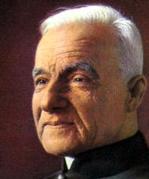Catholic World News News Feature
Pope identifies 'the Church's principal task' for today as Synod closes October 27, 2008
The 12th ordinary assembly of the Synod of Bishops has concluded its discussions on "The Word of God in the Life and Mission of the Church," approving a list of 55 propositions to be delivered to Pope Benedict XVI as the basis for his apostolic exhortation on the topic.
The Synod met for the final time on October 25 to vote on the propositions, and the October Synod formally closed on Sunday with a Mass in St. Peter's basilica. In his homily during that Mass, Pope Benedict remarked that the Synod discussions had reminded all participants of "the bond that exists between the loving reception of the Word of God and disinterested service toward our fellow man."
The Pontiff said that the work of the Synod had served to underline the importance of the topic, strengthening all participants in the conviction that "the Church's principal task, as the start of this new millennium, is above all to nourish herself on the Word of God in order to make new evangelization more effective." During this Pauline year, he said, Church leaders should keep constantly in mind the words of the Apostle: "Woe to me if I do not proclaim the Gospel."
In his homily the Pope returned to themes that had been aired frequently during the discussions of the Synod, which had begun on October 5. He emphasized the importance of understanding the Scriptures in the context of the Church, recognizing that the Spirit conveys understanding of the Word through the teaching magisterium and through the life of prayer. "The privileged place where the Word of God resounds, the Word that builds the Church, is undoubtedly the liturgy," the Pope said. He reiterated the point made by several Synod fathers: that Christianity is not a "religion of the Book" but a faith based on the Person of Christ, the incarnate Word, forming "a mutual relationship, a living bond, between the people and the Book."
The 55 propositions approved by the Synod followed the main lines of discussion during the Synod's general congregations, with few surprises. Following a precedent that he had set at the last Synod meeting, Pope Benedict approved the public release of a full Italian-language text of these propositions. In the past, the Synod's recommendations had not been made public, since they were intended as advisory opinions, to guide the Pope in his preparation of an apostolic exhortation on the topic.
The 55 propositions called for more widespread and prayerful use of the Word of God. Among their more noteworthy suggestions, the Synod fathers recommended:
- Allowing women to be formally instituted as Lectors. Although women frequently perform the readings at Mass-- including pontifical liturgies-- the office of Lector has traditionally been associated with the sacrament of Holy Orders, open only to men. This was the most controversial proposition adopted by the Synod, and received the largest number of negative votes-- although it still won support from an overwhelming majority.
- Emphasizing the need to integrate Biblical scholarship with theological insights, recognizing that faith is essential to a proper understanding of the text. This proposition was obviously a response to a suggestion that Pope Benedict made in an unusual intervention before the general congregation; the Pope had remarked that "if anhermeneutics of faith is lacking, there necessarily arises a positivist or secularist hermeneutic, according to which the divine does not enter into human history."
- Making the Bible available to the broadest possible reading audience, not only through inexpensive translations but also through "radio, internet sites with virtual online distribution, CDs, DVDs, iPods," and other high-tech means of distribution.
- Ensuring that the Bible is "placed in a visible position inside churches.
- Asking pastors to promote "the rediscovery of natural law and its function in the formation of consciences."
During his homily at the closing Mass, Pope Benedict announced that the Synod of Bishops for Africa will meet in Rome next October, and that he will travel to Africa in March 2009 to present the working document for that Synod's discussions. (See today's separate CWN headline story.)
The Pope also made a special mention of the Chinese bishops who had been chosen to participate in this year's Synod, but were unable to attend because of the restraints placed upon them by the Beijing regime. "They are present in our prayers, as are all the faithful entrusted to their pastoral care," the Pope said.






